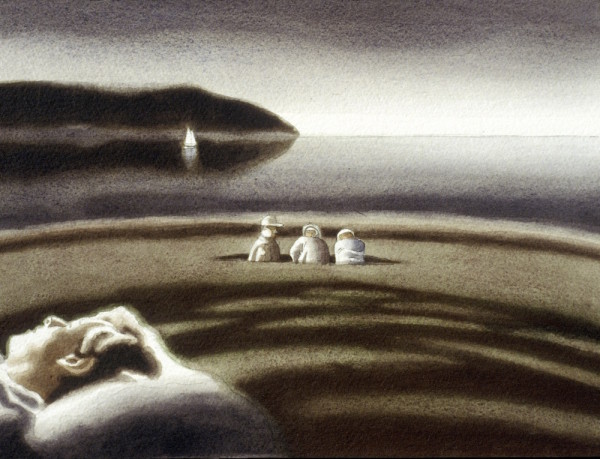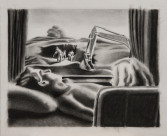Robert returned to this image repeatedly. He first showed construction machines glimpsed outside a hospital room window, with the window appearing between a patient on a bed and a visitor in a chair. As he developed the image, Robert dispensed with the window altogether, blending interior and exterior in a dream-like fashion. A hole dug in a landscape by three workmen has eery suggestions of a grave. This may be a projection of the patient’s fears. The fear is mitigated somewhat by the calm and beauty of the oceanside scene.
In his groundbreaking study, The Interpretation of Dreams, 1900, Sigmund Freud argued that dreams have meaning and reveal the workings of the unconscious. The language of dreams, dreamwork, communicate hidden impulses and needs. Dreamwork employs five strategies: compression (events that might take hours or days or months seem to happen in an instant), dislocation (example: a woman wearing pyjamas appears in a ballroom among people dressed in fancy wear), substitution (symbols: one thing represents another, or an object represents an idea), secondary revision (in the retelling of a dream, we change the story), and over-determination (all symbols have double or contradictory meanings). Robert uses many of these devices in Dream: Diggers. For instance, Robert’s experience as a patient involved both time spent in city hospitals and time spent recovering at his parent’s home in the country. So he has compressed these two events, which happened over many months, into a simultaneous impression. The bed in a landscape is clearly a dislocation. It is tempting to read the men digging a hole in the earth as a symbol for something else: an upcoming surgery perhaps. This symbol could have contrary meanings: it could represent Robert’s fear of death, or the hole could be seen as a gateway or portal to another more hopeful realm of being. Like prisoners planning an escape, the men dig tunnels in the ground.
In a rival theory of dreams, “The Dream-work does not think,” philosopher Jean-Francois Lyotard argued that dreams are not a language that can be deciphered. The meaning of dreams escapes us because dreams express desires that are impossible to put into words. Dreams revert to a time before language. Robert’s picture of his dream leads us away from the dreamer in the foreground to a distant scene: first we see workers, then a sailboat, then a far-off point of land, and finally, the ocean. With each step, we seem to be leaving the concrete world of individual identity and receding into the unknown.




